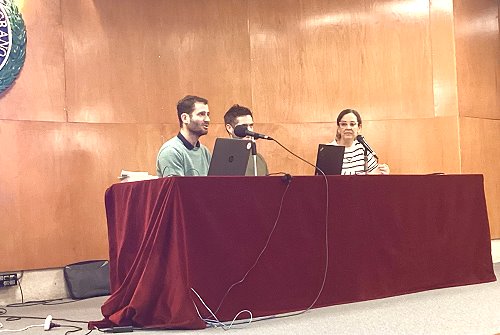
An der Veranstaltung, die am 5. Juni an der Universität von Belgrano stattfand, nahmen renommierte Fachleute teil, die sich mit den Umweltproblemen der Region und den globalen und lokalen Herausforderungen der Weltmeere befassen und nachhaltige Strategien mit Aussichten auf eine kurz- und mittelfristige Umsetzung vorschlugen.
Der Tag wurde von Dr. Lilian Ferré, Direktorin des Fachbereichs Biowissenschaften der Fakultät für Exakte und Naturwissenschaften, eröffnet, die auch als Moderatorin der Vorträge fungierte.
Die Veranstaltung war in zwei Blöcke gegliedert. Im ersten Block nahmen anlässlich des Weltumwelttags Gonzalo del Castillo, Politikwissenschaftler und Geschäftsführer der Stiftung Club of Rome Argentina, und Lucas Gómez Ríos, Professor an der Universität Belgrano, Spezialist für den Erhalt der Artenvielfalt und technischer Analyst des Blue Corridor Program der Wetlands Foundation / Wetlands International, teil.
Gonzalo del Castillo betonte in seinem Vortrag mit dem Titel „Jenseits der Grenzen des Wachstums: ökologischer Kollaps oder ökologische Regeneration", dass das Umweltproblem nicht nur technischer, sondern auch ethischer, kultureller und zivilisatorischer Natur ist. Aus diesem Grund kritisierte er das Paradigma, das die Natur nur als „Ressource" betrachtet, und betonte die Notwendigkeit, uns selbst als Teil davon zu erkennen. Darüber hinaus hob er die Dringlichkeit hervor, das Bildungswesen und die vorherrschende Weltanschauung zu verändern, um tiefgreifende und nachhaltige Veränderungen zu erreichen.
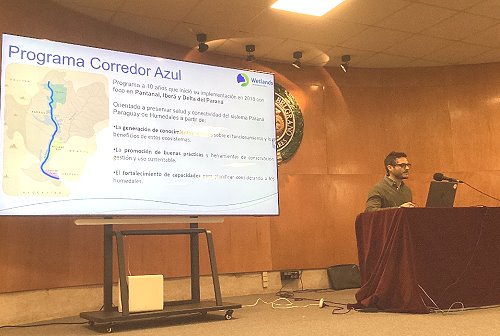
Lucas Gómez Ríos stellte seinerseits die Ausstellung „Veränderungen der Feuchtgebiete im Paraná-Delta: Überlegungen zur Urbanisierung und zum Territorialmanagement" vor, in der er die vielfältigen Probleme beschrieb, mit denen die Feuchtgebiete des Blauen Korridors konfrontiert sind. Diese Initiative zielt darauf ab, die Gesundheit, Konnektivität und Nachhaltigkeit des Systems der Feuchtgebiete, das den Flusslauf Paraná-Paraguay bildet, zu erhalten und zu stärken. Dieser Korridor erstreckt sich über etwa 3.400 km vom Pantanal in Brasilien bis zum Paraná-Delta in Argentinien und gewährleistet einen ungehinderten, kontinuierlichen Fluss sowie ein eng vernetztes Ökosystem.
Der zweite Teil, der dem Weltozeantag gewidmet war, umfasste Vorträge des Naturforschers Miguel Iñíguez, Präsident der Cethus-Stiftung und Magister in Umweltbildung, sowie von Dr. Marcelo Morales Yokobori, Vizepräsident der NGO Mundus maris, Professor und Forscher an der Universität Belgrano.
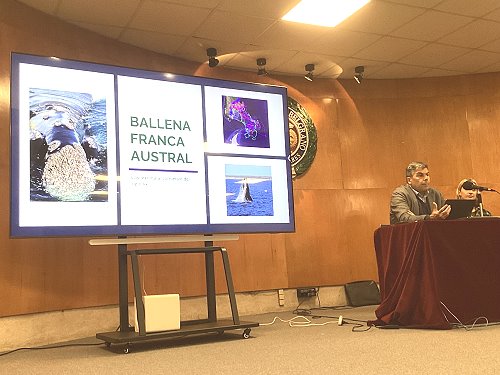
Miguel Iñíguez' Vortrag mit dem Titel „Cetaceans: a window to the ocean" (Wale: ein Fenster zum Ozean) befasste sich mit verschiedenen Arten, darunter der Südliche Glattwal (Eubalaena australis), dessen historische Population in der südlichen Hemisphäre bei etwa 250.000 Individuen lag und aufgrund intensiver Bejagung auf weniger als 4 % zurückgegangen ist. Hervorgehoben wurde der Fang von etwa 35.000 Exemplaren zwischen 1780 und 1820 in den Gewässern Argentiniens und seiner Nachbarländer.
Dank ihrer Schutzmaßnahmen ist die Art zu einem Symbol für den Ökotourismus mit Walen in Patagonien geworden und hat eine bemerkenswerte Erholung erfahren, die sogar die Tragfähigkeit in Gebieten wie der Halbinsel Valdés übersteigt und ihre Ausbreitung in Richtung Mar del Plata, Feuerland und andere Küstengebiete begünstigt hat. Der Walbeobachtungstourismus hat erhebliche wirtschaftliche Vorteile gebracht und zur Schaffung neuer Meeresschutzgebiete beigetragen.
Es wurde auch hervorgehoben, dass diese Walart eine der ersten Arten in der südlichen Hemisphäre war, bei der die Auswirkungen des Klimawandels sichtbar wurden: Der Rückgang der Eismassen hat ihre Wanderrouten verändert und die Verfügbarkeit von Krill verringert, was sich auf die Nährstoffqualität der Muttermilch und damit auf das Überleben der Jungtiere auswirkt.
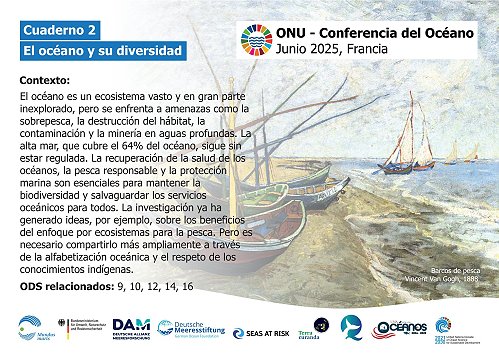
Dr. Marcelo Morales Yokobori stellte den Vorschlag „Die 4 blauen Notizbücher" vor, eine Initiative, die an der Ozeankonferenz der Vereinten Nationen (UNOC3) teilnahm, die in der folgenden Woche in Nizza stattfand. Dieses Bildungs- und Partizipationsprojekt fördert die Ozean-Kompetenz durch persönliche Geschichten, kulturelle Reflexionen und Lebenserfahrungen, die mit dem Meer verbunden sind.
Jedes Notizbuch befasst sich mit einem anderen Thema und sammelt Beiträge von jungen Menschen, Lehrern, Fischern, Wissenschaftlern und Küstengemeinden. Auf diese Weise wird die Vielfalt der Verbindungen, die Menschen zum Meer aufbauen, hervorgehoben und das globale Bewusstsein für dessen Schutz gefördert. Der Vorschlag lädt zum Dialog, zum Schreiben, zum Austausch und zum Handeln zugunsten der Meere ein und fördert interkulturelle Empathie und kollektives Engagement für den nachhaltigen Schutz des Ozeans. Dieser Ansatz soll dazu beitragen, die Zerstörung der Meere rückgängig zu machen und ihre langfristige Widerstandsfähigkeit zu gewährleisten.
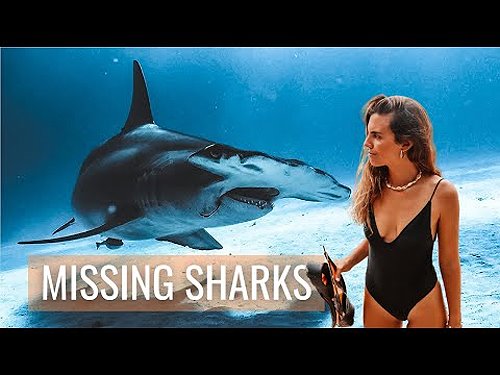
Die Veranstaltung endete mit der Vorführung des Kurz-Dokumentarfilms „Missing Sharks" der Fotografin, Journalistin und Taucherin Martina Álvarez. Diese Arbeit deckt den alarmierenden Rückgang wenig bekannter Haiarten auf, die weltweit im Ozean und den Meeren leben. Viele von ihnen stehen kurz vor dem Aussterben, ohne dass man überhaupt weiß, wieviele Exemplare noch übrig sind. Anhand von Aussagen von Wissenschaftlern, Naturschützern und Küstengemeinden wird deutlich, wie Beifang, Überfischung und fehlende Daten still und leise zum Verschwinden dieser für das Gleichgewicht der Meere so wichtigen Raubtiere beitragen. Der Dokumentarfilm ist ein dringender Appell, diese „unsichtbaren" Arten in die weltweiten Naturschutzbemühungen einzubeziehen, bevor es zu spät ist.
Wir danken Sofía Ziliotto, Studentin im Hauptstudium der Biologie, für ihre Mitarbeit bei der Organisation der Veranstaltung.
